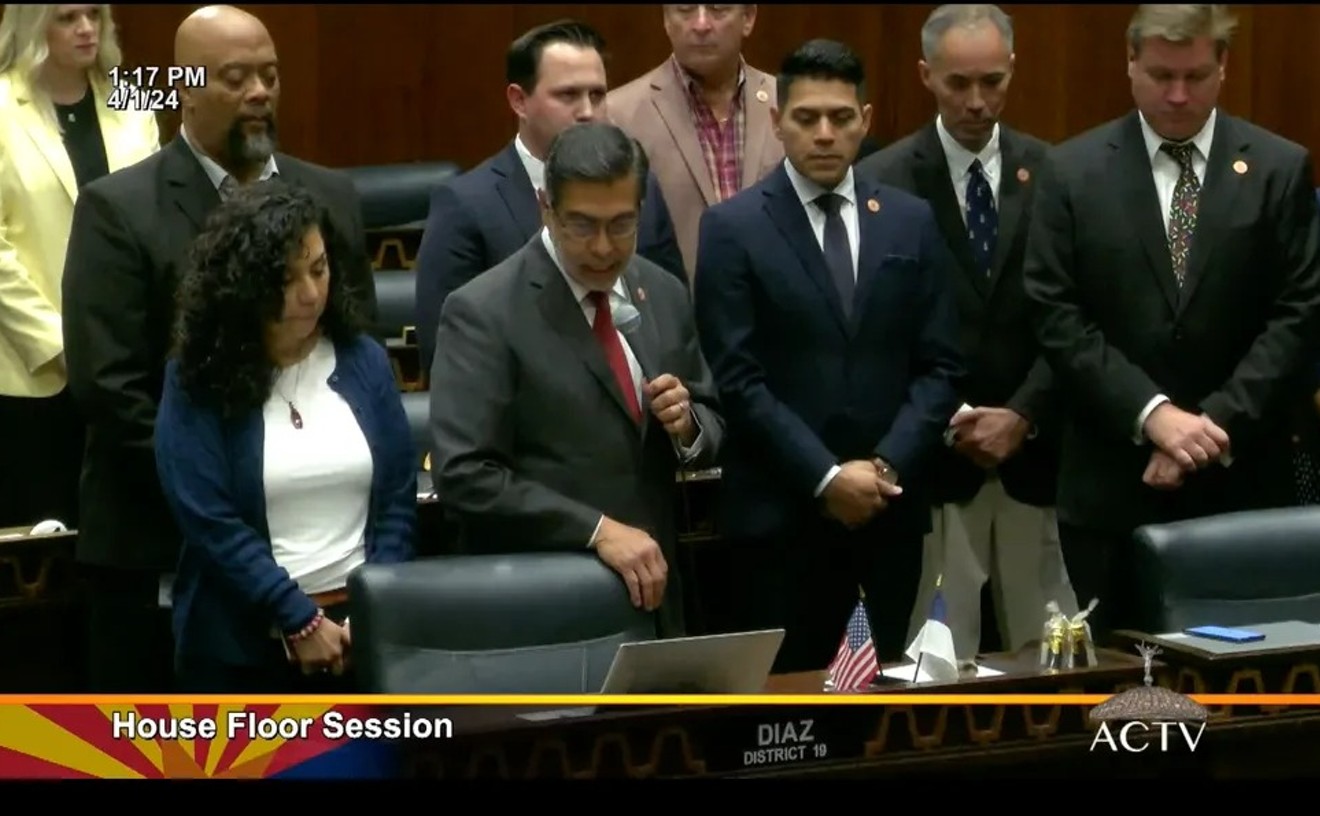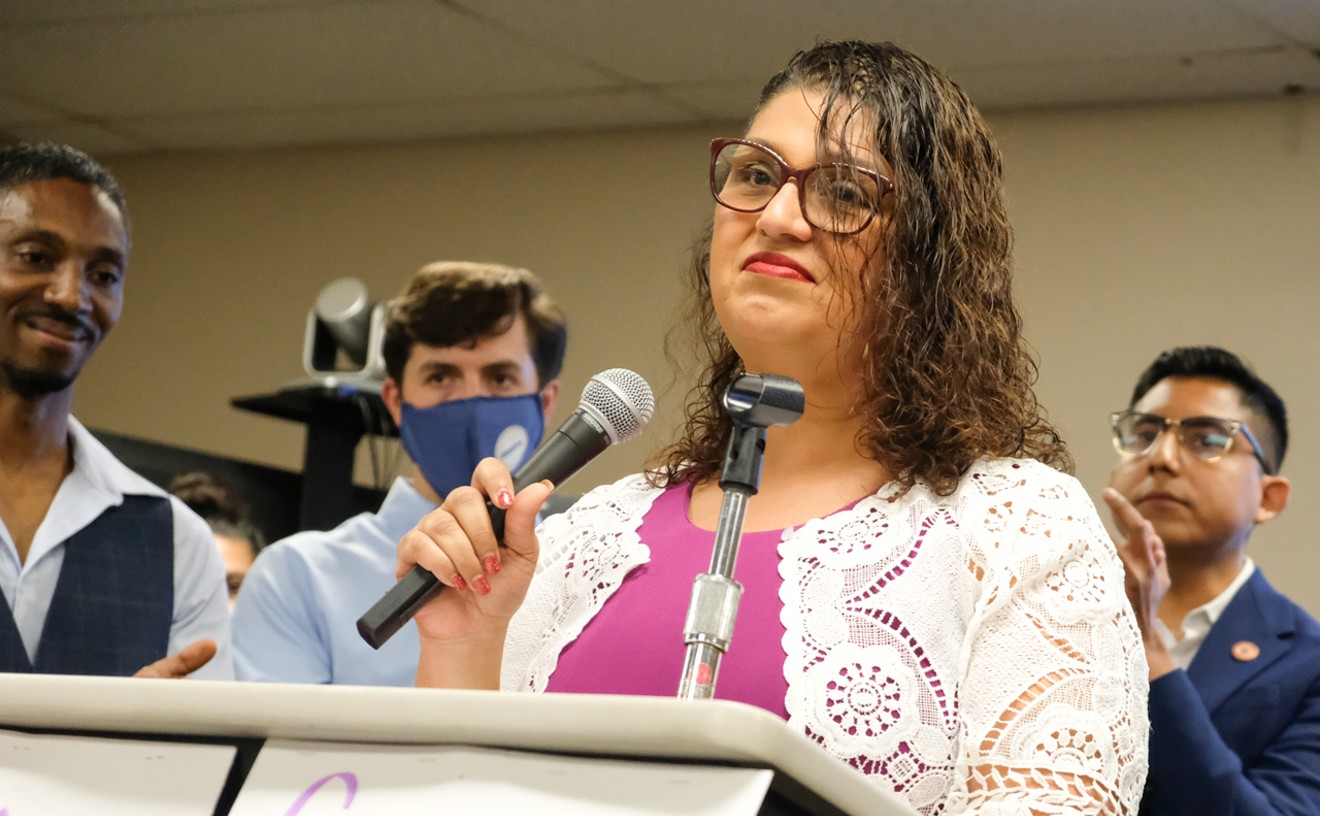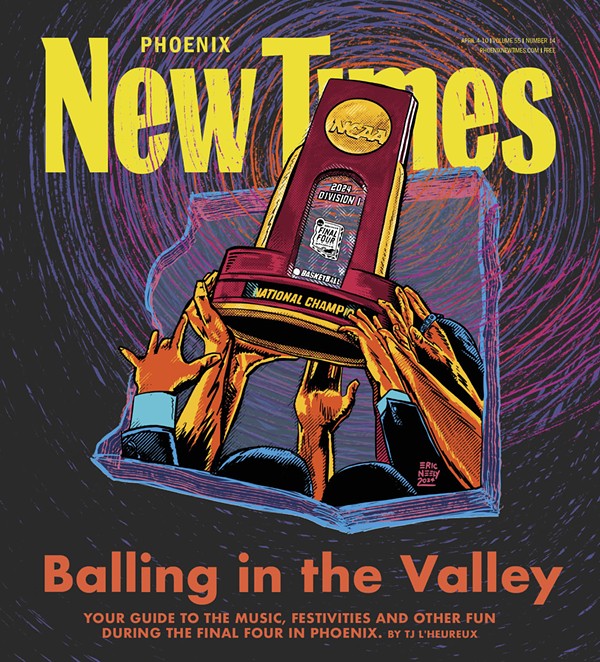The 2016 edition of New Times' Best of Phoenix is out now, featuring a series of essays that explore how our city's proximity to Mexico makes it better.
The fervent chant rolled through the stands and down onto the field, waves of sound crashing over me on the midfield line. A crowd of more than 40,000 soccer fans, including thousands of Mexican nationals, filled Bank One Ballpark to see Mexico take on Yugoslavia in a friendly match. The Mexican team, known as “El Tri,” for the tricolor green, white, and red Mexican flag, was prepping for the FIFA World Cup. I was introduced at halftime as Arizona Governor Jane Dee Hull’s Mexico policy aide, there to deliver an official proclamation establishing Mexico National Soccer Team Day.
I was nervous as hell. My heart pounded in my ears, and the microphone trembled in my hands as I sweated in my black suit, the faint chill of the Phoenix night failing to cool my anxiety. I stood as firmly as I could to face my mass audience, plowing into the English version of the proclamation. When I shifted into Spanish, I felt and heard a sudden change in the crowd. They were responding to me, chanting in unison, and I found my voice growing stronger and more confident. It was exhilarating.
I climbed the stairs back to the stands, where my friends from my weekend pickup soccer games — a mix of Mexicans, Colombians, gringos and pochos — awaited my triumphant return. Still riding my adrenaline high, I pressed gleefully, “Did you hear them cheering me on?” My friends erupted in laughter. A Mexican friend managed to contain himself long enough to blurt, “They were chanting ‘Licencias! Licencias! Licencias!” Driver’s licenses. Aw, hell. They weren’t cheering me; they were jeering me as the mouthpiece for the Republican governor who refused driver’s licenses for undocumented immigrants.
The added irony is that I was one of several members of the governor’s Mexico policy staff who had urged her to grant licencias. Hull had seriously considered it for policy and diplomacy reasons. The policy rationale for licencias was sound: It would be better for public safety for undocumented drivers to be identified and insured. And Hull valued the state’s relationship with Mexico highly; she cultivated such good relations with our neighbor that the Mexican government awarded her the Order of the Aztec Eagle, the highest recognition given to a foreigner for service to Mexico.
But by the time I came to be standing before El Tri and their fans at BOB, it was February 2002. Just months before, 9/11 had turned the nightmare scenario of a flawed immigration system into a reality. The impact of the terrorist attacks reverberated along the Southwest border, and Arizona-Mexico relations have never been the same. 9/11 triggered the first of several major shifts in our cross-border relations that I’ve observed over the past 15 years. As part of Hull’s staff, I experienced close up the gradual downturn in Arizona-Mexico relations that followed 9/11. While I was off to law school and later back in Phoenix to practice, I watched the sharp plunge in relations associated with Sheriff Joe Arpaio and SB 1070. Today, I am living the resurgence in Arizona-Mexico relations as the Mexico trade representative for the City of Phoenix. All these different phases of our diplomatic and trade relations are linked in my mind to the ups and downs of El Tri.
El Tri lost to Yugoslavia that day of February 13, 2002, 2-1, emblematic of the downward turn in Arizona-Mexico relations that followed 9/11. We on the governor’s Mexico staff felt the change immediately, as we were in the midst of preparing for Arizona to host the 2002 Border Governors Conference, the annual gathering of the six Mexican border state governors (Baja California, Chihuahua, Coahuila, Nuevo Leon, Sonora, and Tamaulipas) with the four U.S. border governors (Arizona, California, New Mexico, and Texas). The governors’ agenda included cooperation on an array of border issues, from the environment to healthcare to economic development. But after 9/11, everything was subordinated to border security. We led the planning process and negotiated policy proposals with the Mexican border states. “You need to reframe your immigration concerns in security terms,” I would tell them. They refused, in part because they didn’t want to give any credence to the notion that undocumented Mexicans should be considered a security threat.
The 2002 Border Governors Conference took place during the World Cup in Korea and Japan, juxtaposing border politics and U.S.-Mexico soccer politics. When Mexico played against the U.S. in the months and years that followed 9/11 — especially when they played in Mexico City’s Estadio Azteca — Mexican soccer fans were said to taunt the U.S. players with chants of “Osama! Osama!” These adversaries did not need the politics of terrorism and immigration to heighten the drama. A genuine rivalry had emerged as the U.S. team had overcome Mexico’s historic dominance and outplayed its neighbor in the early-to-mid 2000s, much to my joy as a U.S. fan. This role reversal culminated in the bruising 2002 World Cup semifinals, in which the U.S. team dealt Mexico a humiliating 2-0 upset. I remember vividly the growing desperation of the Mexican team as the clock ticked away, and Mexico’s stalwart central defender Rafael “Rafa” Márquez dishing out brutal tackles in frustration.
Arizona-Mexico relations remained cordial, albeit touchy. Arizona hosted a successful Border Governors Conference, with all 10 governors in attendance at the Arizona Biltmore. There were moments of amusement, such as then-Texas Governor Rick Perry sauntering by me and a female intern in a ceremonial receiving line, the governor pointing his index finger and cocking his thumb at us with a “click click” and a “How ya doin’?” And there were moments of inspiration, such as the comeback speech from Chihuahua Governor Patricio Martínez, who was recovering from a January 2001 gunshot wound to the head, a possibly narco-related assassination attempt. Border security in relation to illicit drug and immigrant smuggling activities was on everyone’s mind, if not on everyone’s lips.
Despite these tense and weighty issues, the collaborative spirit of the conference gave reason to believe Arizona and Mexico would be okay. Hull’s final speech to the assembly of border governors, which I wrote, painted a hopeful vision for the future integration of the border region, the kind of talk that gives the shut-down-the-border crowd fits: “One day, crossing the border will be as easy as swiping your Visa, MasterCard, or American Express.” The 2002 Border Governors Conference would stand in marked contrast to the 2010 conference eight years later. Arizona was to play host once again that year under Governor Jan Brewer, until a boycott over SB 1070 by all six Mexican border governors forced the cancellation of the event.
The post-9/11 strain on Arizona-Mexico relations began to show years before the backlash against SB 1070 plunged Arizona-Mexico relations to its low point. Political circumstances dictated a tougher approach to border security for Hull’s Democratic successor, Governor Janet Napolitano, who signed into law some of the most severe sanctions in the country against employers who knowingly hired illegal immigrants. The employer-sanctions law coincided with Sheriff Arpaio’s so-called “crime” sweeps and Rep. Russell Pearce’s various precursors to SB 1070, basically attempting to require all local police to implement the sheriff’s aggressive tactics. I watched this shift in Arizona-Mexico relations from a distance in Cambridge, Massachusetts, where I got my law degree and master’s in public policy, and wrote my thesis on state and local enforcement of federal immigration law.
The U.S.-Mexico soccer rivalry was heating up at the same time as Arizona’s immigration tensions. The rising animosity between the national teams spilled onto the field in the form of sharp elbows, rough tackles, and head-butts. When a “friendly” match between the U.S. and Mexico was set for University of Phoenix Stadium on February 7, 2007, the U.S. Soccer Federation promoted the game with the cheeky slogan: “Come See the Beautiful Game Get a Little Ugly.” As I watched the game on television from my apartment in Massachusetts, a sign hoisted by a U.S. fan caught my eye: “There Are No Friendlies.” The U.S. once again beat Mexico 2-0, and the players walked off without shaking hands.
The day after the match, gunmen opened fire on a pickup truck of undocumented immigrants in the Ironwood Forest National Monument near Tucson, killing two men and a 15-year-old girl. Napolitano arrived in Mexico City that day to meet with new President Felipe Calderón about trade relations. Their conversation unavoidably turned to the investigation into the shooting (later revealed to be a clash between rival gangs of smugglers) and immigration reform. The situation reminded me of my last trip to Mexico City with Hull in January 2002, for a meeting with President Vicente Fox. The visit came shortly after 14 Mexican immigrants had been found dead from heat exhaustion in the infernal Arizona desert while trying to evade Border Patrol. That became the focus of the trip for the Mexico City press, which often seemed convinced that Arizona was the Wild West and Mexican immigrants were the hunted.
Where Governors Hull and Napolitano took pains to rebut the anti-immigrant image of Arizona year after year, Governor Jan Brewer took just one year in office to cement it. I had been back in Phoenix practicing law for just over a year when, in 2010, Brewer signed SB 1070. The protests, boycotts, lost revenue, lawsuits, and international reputational damage wrought by SB 1070 are well known.
I watched most of this drama from the sidelines, but a few months later, I found myself with a bit part on the stage of Arizona’s immigration wars. A friend called my law office unexpectedly to tell me the Franco-Spanish musician and activist Manu Chao was coming to Phoenix for a benefit concert for day laborers and wanted to film a video of his pro-immigrant anthem in front of Tent City. Could I come and make sure they didn’t get arrested? I was a big fan of Manu Chao, so this was surreal. Sheriff Joe’s deputies quickly descended on us once they heard music and saw us milling around outside the fence. They were cautious at first, not sure what to make of it: “This isn’t going to end up on YouTube, is it?” I summoned my most lawyerly bullshitting to keep them at bay long enough for Manu Chao to record a four-minute video for “Clandestino,” which starts like this:
Solo voy con mi pena
Sola va mi condena
Correr es mi destino
Para burlar la ley
Alone I go with my sorrow
Alone I am condemned
I am destined to run
To escape the law
If you look, you can find it on YouTube.
My small part in Manu Chao’s protest art reminds me constantly of the anti-immigrant image Arizona must continue to rebut with action. I am fortunate to get to do that every day at work. In 2014, I joined the consulting firm Molera Alvarez, and my role includes serving as the City of Phoenix Mexico trade representative. We conduct frequent visits all over Mexico for the mayor, City Council, and private sector leaders, and we see a Mexico that is receptive and eager to leave SB 1070 behind and focus on the future. Mayor Greg Stanton and Tucson Mayor Jonathan Rothschild, among others, kept the torch burning during the stormy Brewer years, and have kept up that commitment with some 20 trade missions in the past four years. And Governor Doug Ducey has made a marked and welcome change in the Ninth Floor’s posture toward Mexico. Today, the state’s approach to Mexico is all about “Arizona: Open for Business.”
The frequency of visits to Arizona from Mexican public- and private-sector leaders is picking up, and El Tri itself visited Phoenix this June. The Mexican team came to play Uruguay in the Copa America tournament at University of Phoenix Stadium. I had the thrill of greeting the team with Stanton at the airport, and shaking the hand of none other than Rafa Márquez, the tough-tackling nemesis of the U.S. team in that World Cup match 14 years ago. My two little boys and I cheered Rafa and El Tri on at the packed stadium on June 5, as they trounced Uruguay 3-1 in a lopsided upset. El Tri is on the rise, though its tournament ended in disappointment in the quarterfinals. As the cliché goes, you can’t get complacent, because you’re only as good as your last game.
Those of us who care about Arizona-Mexico relations can’t afford complacency either. The brand on Arizona as anti-immigrant, undeserved though it is, remains. Just a few months ago, in a meeting with Mexico’s Senate about joint legislative training programs, I was asked why they should consider working with Arizona. Uncertainty looms in the form of Republican presidential nominee Donald Trump’s demagoguing about building a “huge” border wall, even though the idea is widely regarded as legally and logistically impossible. The outgoing Mexican Consul General in Phoenix, Roberto Rodriguez, one of the great community leaders in the Arizona-Mexico relationship through difficult times, recently held a casual going-away party attended by dozens of friends of Mexico. His parting words to us were, “Whatever happens, and you know what I mean, we are still friends.”
James Ahlers is an attorney, consultant, and writer who has worked in Mexico and Latin America for more than 20 years. He serves as Mexico Trade Representative for the City of Phoenix through consulting firm Molera Alvarez, LLC, where he also acts as General Counsel.










